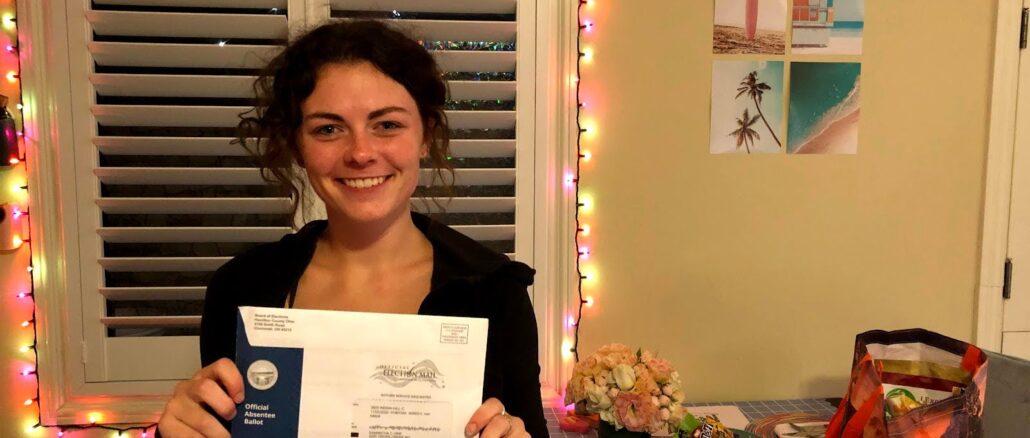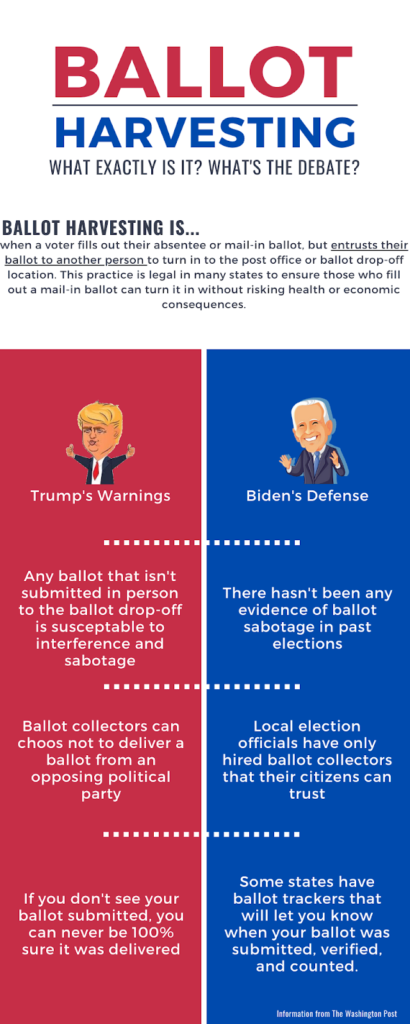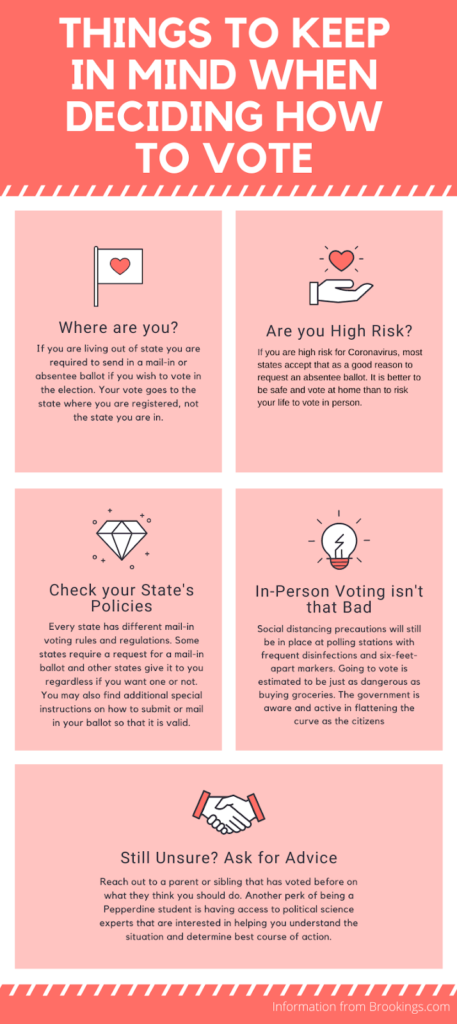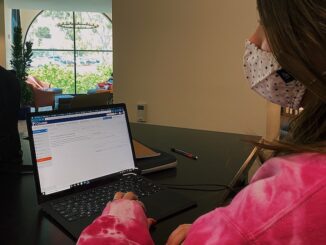
Normally, the big debate in a presidential election year is who to vote for for president.
But this year, voters are debating how to even vote.
The debate revolves around mail-in voting and whether or not it is a reliable way to submit ballots and know they will be counted. With many states encouraging mail-in voting to prevent the spread of the coronavirus, President Donald Trump and fellow Republicans are arguing that mail-in ballots are susceptible to fraud. Democrats and most election officials argue there is no proof of fraud or corruption.
“This election is especially confusing,” said Gideon Lee, a sophomore communication major and Democrat. “But it is more important than ever to search for the truth behind your vote.”
Pepperdine University is home to hundreds of new voters who will be voting for the first time in this upcoming 2020 election. And although not all Pepperdine students believe inTrump’s claims, they do agree that there is some risk when it comes to mail-in ballots.
Trump’s claims
Trump has spent most of the summer critiquing mail-in ballots, mostly via Twitter. He’s provided little evidence to back up his claims, according to numerous facts checks.
“MAIL-IN VOTING WILL LEAD TO MASSIVE FRAUD AND ABUSE,” Trump tweeted May 28.“ IT WILL ALSO LEAD TO THE END OF OUR GREAT REPUBLICAN PARTY.”
Election officials have repeatedly defended the integrity of mail-in ballots and their protections against fraud.
The Republican Party isn’t arguing that if voters utilize mail-in ballots, their votes won’t be counted.
“I think that Trump is making an argument that this kind of voting is more susceptible to fraud,” Soper said. “Now, he is doing that in the absence of any evidence that there is a lot of systematic fraud historically with mail-in or absentee ballots.”
By warning that there is a problem before the election, the Republican Party can use mail-in ballot fraud as an excuse for losing a close race, Soper said.
“Others may accuse him of trying to muddy the waters,” Soper said, “raising questions about the legitimacy of an outcome if he loses the race.”
This isn’t the first time Trump has cast doubt on the validity of the United State’s voting process. Shortly after his election win in 2016, Trump ordered a commission to investigate possible voter fraud in each state, arguing that the only way he won the electoral college vote and not the popular vote was due to mass voter fraud, according to a January 2018 New York Times article. Trump disbanded the commission in 2018 due to lack of evidence and potential litigation with states.
There are four main claims to the Republican argument. The first argument is mailbox robbing, in which a stranger takes ballots out of mailboxes to fill in, according to the New York Times. Trump also tweeted that people will copy valid mail-in ballots and distribute them to non-registered voters. He also has said ballots will be purposely miscounted or thrown away by election officials in charge of counting ballots. Finally, Trump fears ballot harvesting will be used to shift the vote, according to the Washington Post.

The Democratic Party’s main argument against the Republican accusations is that there simply is no proof behind any of these claims, according to the Brennan Center for Justice. Party leaders have said Trump’s arguments are a way to cast doubt on the validity of the voting process in case the Republican party loses the election. They have also encouraged voters to stay indoors and away from in-person voting stations to avoid the spread of COVID-19.
Soper said the Democratic Party has pushed for mail-in voting against Trump’s claims in hopes that the voters who choose to vote by mail will be Biden supporters.
“A possible Democratic belief is that the Democratic Party may benefit from a higher turnout if they make it easier to vote,” Soper said. There is no evidence to back that belief, however.”
The truth
The debate initially began with a Republican belief, Soper said.
“[Republicans] may believe that Trump supporters are more determined than Biden supporters,” Soper said, “to actually go out there and make the effort to vote in person.”
By supporting stronger mail-in voting restrictions, the Republican Party is making it slightly more difficult to vote remotely.
Mail-in ballots have been around almost as long as elections. Deployed soldiers used absentee ballots to cast votes from foreign countries for years, according to a Brookings Institution video. States started really utilizing mail-in ballots in the 1996 election, according to Pew Research Center.
There are three types of mail-in ballots, according to Brookings: universal, no-excuse, and absentee ballots. States that have universal mail-in ballots give every registered voter a mail-in ballot automatically. In the states that use no-excuse ballots, any voter can request a mail-in ballot without a reason. Absentee ballot states require a reason, such as being sick or living out of state, to request a ballot.

The student perspective
The debate over mail-in ballots has sowed some doubt in the election. In interviews with seven Pepperdine students, four Democrats and three Republicans, most rejected widespread fraud but all said they believed that there is at least some truth to Trump’s claims.
Over the past few elections, the partisan divide seems to be getting wider and wider.
“I think if you support Trump you’re going to believe more stuff that he says,” said Emma Rogers, sophomore business major and Democrat.“You’re going to believe that mail-in ballots are not going to be counted. But if you believe Joe [Biden] you know that that’s a lie.”
Out of the seven students interviewed, five students — three Democrats and two Republicans — are intending on voting in-person while two — one from each party — are planning on voting by mail.
Gabby Wells, a sophomore integrated marketing communication major and Republican, said she was voting in person because she feared — in line with the president — that her vote would be lost or stolen.
“Trump explained how there is voting fraud with many of the ballots,” Wells said, “and how the authorities are finding them in rivers and dumps across the country.”
Wells said she doesn’t believe that Democratic voters are taking Trump’s warnings seriously and that social media is a big contributor to this ignorance.
“Social media has a great effect on people, impacting their ideas of politics, celebrities and politicians,” Wells said. “They’re all against any ideas regarding the presidency of Trump for another four years.”
While Lee said he doesn’t believe all of Trump’s claims, he worries about possible middle-man errors that could arise from not turning in his ballot in person, such as the post office accidentally losing his ballot or the ballot not arriving on time.
“I just feel more comfortable knowing firsthand that my ballot got to its destination safely,” Lee said.
Others, like Mackie O’Malley, a senior business major and Democratic voter, were voting in person because there were fewer COVID-19 cases in their districts. O’Malley said she has nothing to worry about at polling places as long as people follow social distancing policies.
“I’m mainly voting by mail for convenience sake,” said Haley Hoidal, a sophomore art major and Democrat. “But also for my parents. I know that I am low risk, but both of my parents have asthma which means they’re high risk for COVID-19.”
Tanner Rynd, sophomore business administration major and Republican voter, said he did not want to wait in the cold for hours during a pandemic when he can vote from the comfort of his own home. Rynd doesn’t believe Trump’s claims of theft and fraud and thinks that his ballot is safe in the hands of his local post office.
One reason students gave for voting in person was fear of self-error.
“I know I’m going to forget to send it in if I don’t go in person,” Rogers said.
It all comes down to what risks voters are willing to take to submit their votes.
Lilah Ause, a sophomore communication major and Republican, believes that there is an increased risk of contracting COVID-19 if she votes in person, but is choosing to vote in person anyways.
“Anywhere you go is kind of a question of if it’s a risk you’re willing to take,” Ause said, “And in my opinion, voting is important enough to take that risk.”
Elizabeth McLaughlin completed the reporting for this story in Jour 241 in Fall 2021 under the supervision of Dr. Christina Littlefield and Dr. Theresa de los Santos. Dr. Littlefield supervised the web version of the story.




